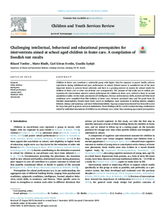Abstract
Children in foster care constitute a vulnerable group with higher risks for exposure to poorer health, adverse experiences during childhood and poor performance in school. School success is considered one of the most important factors to prevent future adversity and there is a growing interest in society for school results for children in foster care or other out-of-home care arrangements. The purpose of this study was to outline prerequisites for interventions aimed at school performance for children in foster care, related to those in normal population studies. In this study assessments of intelligence, literacy and numeracy skills, mental and behavioral conditions were compiled from 856 children in foster care, between preschool class and 7th grade from 22 Swedish municipalities. Results show lower scores in intelligence, most prominent in working memory, adaptive behavior, literacy and numeracy, and more behavioral problems. Ingroup comparisons showed less favorable scores for boys than girls in general, except in mathematics. These findings call for a need to adapt learning conditions in school by individual assessments of children in out-of-home care, rather than assuming age-typical prerequisites.
View article here.

